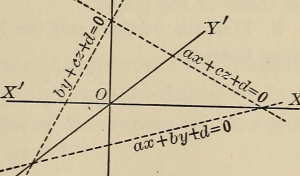16 Mathematics

Book Collections & Textbooks
- APEX Calculus: Written by Gregory Hartman, Professor of Applied Mathematics at Virginia Military Institute. A grant-funded project for supporting significant change in education.
- Math in Society by David Lippman: “This book is a survey of contemporary mathematical topics, most non-algebraic, appropriate for a college-level quantitative literacy topics course for liberal arts majors. The text is designed so that most chapters are independent, allowing the instructor to choose a selection of topics to be covered. Emphasis is placed on the applicability of the mathematics. Core material for each topic is covered in the main text, with additional depth available through exploration exercises appropriate for in-class, group, or individual investigation. This book is appropriate for Washington State Community Colleges’ Math 107.”
- OpenStax Mathematics Textbooks : Peer-reviewed open textbooks; Algebra & Trigonometry; Statistics; Algebra; Pre-algebra; Pre-calculus; Introduction to Business Statistics
- OpenTextBookStore Catalog – Mathematics: “OpenTextBookStore was created by educators frustrated with the time involved in finding adoptable open textbooks, with the hope to make open textbook adoption easier for other faculty.” Catalog contains book description, table of contents, and a list of any available supplements. Includes information on license and file formats, and a rating from the editors. Contributors include David Lippman, Scottsdale Community College, College of the Redwoods, Carl Stitz, & Jeff Zeager
- Mathematics Textbooks – Open Textbook Library: Multivariable Calculus; Geometry with an Introduction to Cosmic Topology; Mathematical Analysis I; Lies, Damned Lies, or Statistics: How to Tell the Truth with Statistics; Open Resources for Community College Algebra; Introduction to Game Theory: a Discovery Approach; Introductory Statistics with Randomization and Simulation – First Edition; Trigonometry; Introduction to Statistics; Statistical Inference For Everyone; Calculus: Early Transcendentals; Proofs and Concepts: The Fundamentals of Abstract Mathematics; Linear Regression Using R: An Introduction to Data Modeling; Introductory Business Statistics; & more
- In Number Theory: In Context and Interactive: Written by Karl-Dieter Crisman t the Department of Mathematics and Computer Science, Gordon College
- Calculus I & Calculus II: Written by mathematics faculty at Front Range Community College – Boulder County Campus
- Virtual Lab and Science Resource Directory: Math: This directory was created in response to the post-secondary science community’s requests for help with the hands-on portions of their courses in light of the COVID-19 pandemic. Virtual labs and science resources were identified by BCcampus, then vetted by subject matter experts. The resources in this directory are intended to support remote science education, either by supplementing concepts or replacing physical labs.
- Geometry with an Introduction to Cosmic Topology: Written for students who have taken vector calculus, the text “explores the interplay between the shape of a space and the type of geometry it admits; suitable for a semester course in non-Euclidean geometry or as a guide to independent study, with over 200 exercises and several essays on topics including the history of geometry, parallax and curvature, and research aimed at determining the shape of the universe.”
Repositories & Research
- Mathispower4u Tutorials by James Sousa: A website linking to “over 7,000 free mini-lessons and example videos.” All of the videos are closed captioned and ADA compliant; CC BY-SA
- Math Insight: “The Math Insight web site contains both narrative pages and interactive applets focusing on the concepts underlying a few topics in mathematics. It has the largest coverage of multivariable calculus, as its origins are from the CSE Multivariable Calculus and Vector Analysis course at the University of Minnesota. Although no effort has been made to turn this into a comprehensive source of information on any topic, the goal is to provide some depth on selected topics, so readers can explore mathematical concepts at different levels, depending on their preparation or interest.”
- SageMath: SAGE (System for Algebra and Geometry Experimentation) is a a free open-source mathematics software system licensed under the GPL that covers many aspects of mathematics, including algebra, combinatorics, graph theory, numerical analysis, number theory, calculus and statistics. “Creating a viable free open source alternative to Magma, Maple, Mathematica and Matlab.”
OER SPOTLIGHT: MATHEMATICS
 Mathispower4u Tutorials by James Sousa: over 7,000 free mini-lessons and example videos; all of the videos are closed captioned, ADA compliant, and organized by course and topic.
Mathispower4u Tutorials by James Sousa: over 7,000 free mini-lessons and example videos; all of the videos are closed captioned, ADA compliant, and organized by course and topic.
CC BY-SA
Open Courseware & Learning
- MA 124 Contemporary Mathematics: “This course is intended to explore some basic mathematical concepts of general interest and use to students in the liberal arts.; Curated by Annette Yauney at Herkimer County Community College.” [CC BY]
Video
- MIT OpenCourseWare Math YouTube Playlist: Videos CC BY-NC-SA
- Rootmath math videos: Linear Algebra; Calculus; Fractions; Algebra; Factoring [YouTube; CC BY]
Interactive
- Interactive Math Exercises: Curated interactive exercises for teaching math. Starting with the basics, up to vector calculus and linear algebra. Many exercises have been created by OpenStax. and adapted by Grasple.
- MIT Mathlets: “The MIT Mathlets constitute a suite of interactive Javascript applets designed to enhance selected university level STEM classes. They were initially developed under a generous grant from the d’Arbeloff Fund for Excellence in Education.”
- Mathematics & Science H5P Content : “The eCampusOntario H5P Studio site uses H5P, an open source plugin, to allow content authors to easily create interactive content for their courses or other instructional projects. eCampusOntario H5P Studio is provided as part of our set of Open Publishing tools and developed by the Wilfrid Laurier University Library.”
- Interactive STEM activities: Mathematics: from the Concord Consortium and funded by the National Science Foundation.
- Mathematics LibreStudio: H5P embeddable interactive content; openly-licensed; learning activities include:: image sequencing, multiple choice, drag & drop, fill in the blanks, interactive book, true/false, question sets, interactive video, sort the paragraphs, collage, and more.
Try the Ratios | Proportional Reasoning Simulation from PhET Interactive
